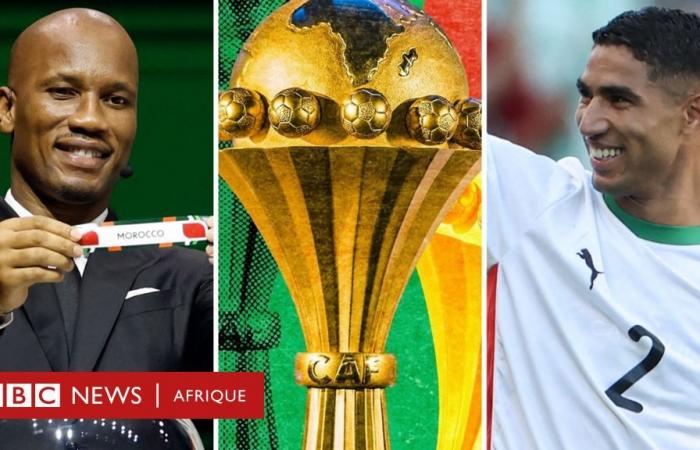Photo credit, Getty Images
- Author, Rob Stevens
- Role, BBC Sport Africa
-
6 hours ago
The BBC takes stock of what we know and don’t know about next year’s Football festival.
For the 2025 African Cup of Nations (CAN), Morocco will host Africa for the second time, after having done so in 1988.
The playoffs ended last November. Several questions regarding the continent’s biggest sporting event remain unanswered.
When will CAN 2025 take place?
The schedule for the biennial competition has changed once again, with club and international competition calendars being very busy and creating a “scheduling nightmare” for the organizer, the Confederation of African Football (CAF).
The last two editions took place in January and February and the commitment made in 2017 to organize the CAN in the middle of the year was once again neglected.
The 2025 edition of the CAN will start on December 21 next year and will continue until January 18, 2026.
This will be the first time the tournament has taken place during the holiday season, which could prove problematic.
The match schedule has not yet been announced, so it is possible that matches could be played on Christmas Day. The first round of the 2023 tournament took place over five days.
When will the players be released?
Photo credit, Getty Images
The date when clubs will be able to release their players has not yet been set, as the 2025 Africa Cup of Nations falls outside the periods already agreed by FIFA for international fixtures.
The European Club Association, which represents more than 700 professional teams on the continent, will undoubtedly be involved in the negotiations, given that many African stars play in Europe’s top leagues…
André Onana’s decision to play for Manchester United in the Premier League just twenty-four hours before Cameroon’s first match at CAN 2023 backfired when the goalkeeper was benched by the Indomitable Lions despite his arriving, via private jet, in time for kick-off.
Warm-up matches have been arranged eight days before the 2023 finals, but it remains to be seen whether the teams participating next year will have a full squad at that time.
What is the format and when does the draw take place?
Photo credit, Getty Images
The format in Morocco remains the same as in the last three editions, with the 24 teams divided into six groups of four.
The top two teams from each group qualify for the round of 16, as do the four best third-placed teams. From there, the competition proceeds through direct elimination.
Before the draw, which will take place on January 27 in Rabat, countries will be placed in one of four pots based on their position in the FIFA world rankings.
Things could get complicated if Ivory Coast, the reigning African champions, are not ranked among the top six African teams.
It is possible that the Elephants will be placed in the first pot anyway, thus relegating a higher ranked nation to the second pot.
In the last ranking, Ivory Coast was the sixth best team on the continent, narrowly ahead of Cameroon.
Where will the CAN 2025 matches take place?
The CAN 2023 matches in Ivory Coast were played in six stadiums across five cities, with all venues having a minimum capacity of 20,000.
The same requirements are in place for the 2025 Africa Cup of Nations. Although the Royal Moroccan Football Federation has not made an official announcement, it is not short of options, given that the country arguably has the best footballing infrastructure on the continent.
A 115,000-seat stadium is being built in the suburbs of Casablanca for the joint organization of the 2030 World Cup, but it will not be ready before the CAN kicks off.
The Mohammed V stadium in Casablanca hosted the 1988 final, but it is the Ibn Batouta stadium in Tangier which today has the largest capacity in the country.
Rabat’s Prince Moulay stadium has been used for the Women’s Africa Cup of Nations in 2022. Agadir, Fez and Marrakech are also leading candidates.
Who are the favorites?
Photo credit, Getty Images
One of the wonders of the African Cup of Nations is its unpredictability.
The last eight editions have provided seven different champions, with Ivory Coast the only nation to have lifted the trophy twice since 2010.
Morocco are the highest-ranked team in Africa since their historic run to the 2022 World Cup semi-finals in Qatar, and pressure is mounting to end what will be a forty-nine year wait for their second continental title.
The Atlas Lions put in a dominant performance in qualifying, scoring 26 goals and conceding just two, to finish with the only 100% record.
But hosting the tournament is not necessarily an advantage. Only Tunisia, Egypt and Ivory Coast have triumphed at home.
Nigeria will look to go one better after being runners-up this year. Senegal and Egypt are among the favorites.
Were there any unexpected qualifications?
There will be no debutants in the African Cup of Nations, but Comoros and Botswana will only be making their second appearances.
Sudan achieved the feat of qualifying in the middle of a civil war, eliminating Ghana, the four-time African champion.
Uganda, which will co-host the 2027 tournament, and Benin are participating for the first time since 2019.
Seventeen teams from the 2023 edition return and there are a record seven qualifiers for Southern Africa.
Who will be the best players?
Photo credit, Getty Images
It is difficult to predict what will happen, because the next twelve months could be marked by injuries which will deprive some stars of their chance.
But, barring a sudden loss of form, Ademola Lookman, recently voted African Footballer of the Year, will lead the charge alongside Nigeria’s Super Eagles, thanks to his excellent form with Atalanta.
Mohamed Salah is putting in some impressive performances for Liverpool this season, and the Egypt captain will be determined to win his first African Cup and end the Pharaohs’ fifteen-year wait for the trophy.
Real Madrid striker Brahim Diaz was the top scorer in qualifying with seven goals for Morocco.
Emilio Nsue (Equatorial Guinea) won the Golden Boot, Nigerian defender William Troost-Ekong was named best player and South African goalkeeper Ronwen Williams outclassed his European rivals by winning the Golden Glove.
Teams qualified for CAN 2025
Morocco (organizing country), South Africa, Algeria, Angola, Benin, Botswana, Burkina Faso, Cameroon, Comoros, DR Congo, Egypt, Gabon, Equatorial Guinea, Ivory Coast, Nigeria, Mali, Mozambique, Senegal, Sudan, Tanzania, Tunisia, Uganda, Zambia, Zimbabwe.






